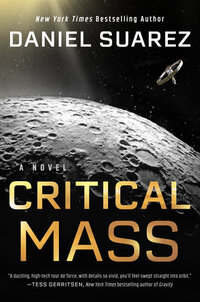Critical Mass by Daniel Suarez
 Monday, January 30, 2023 at 6:29AM
Monday, January 30, 2023 at 6:29AM 
Published by Dutton on January 31, 2023
Combine a geopolitical thriller with a science fiction novel that extends geopolitics into space and you get an astropolitical sf thriller. Critical Mass (a sequel to Delta-v) captures the spirit of adventure and exploration while providing a roadmap to futuristic solutions to humanity’s most pressing problems. Political and ideological strife (not to mention greed) would likely make the roadmap impossible to follow, but it’s good to imagine a better future when disaster looms.
As the novel opens, Adedayo Adisa and Isabel Abarca are on the Konstantin, a ship that is orbiting the asteroid Ryugu. They have been mining the asteroid and sending automated tugs full of minerals back toward Earth’s moon, but the ship is breaking down. The main engines cannot be engaged. Some of the crew have died. To avoid depleting food supplies, three crew members volunteer for a desperate attempt to return to Earth on a spacecraft that wasn’t designed for Earth reentry. Skilled or lucky piloting sends the craft into Earth orbit, where it is promptly claimed by China.
The three returning crew members — Jin Hua Han, James Tighe, and Pria Chindarkar — spend the first part of the novel trying to convince Earth’s nations and private enterprises to build another rocket to rescue Adisa and Abarca. Soon after they departed the Konstantin, however, the ship was boarded by North Koreans. Communications were cut and nobody knows whether anyone is still alive on the Konstantin. The three are nevertheless resolved to find a way back to Ryugu when its orbit next brings it within a reasonable distance from Earth.
Political issues dominate the early chapters. Following the startup model of Uber, Nathan Joyce built the Konstantin and sent it on its mining mission without asking for permission. Joyce’s company theoretically owns the minerals that were launched into a lunar orbit from the Konstantin, but the company is now owned by its creditors. A clever lawyer comes up with a new quasi-legal scheme to operate a business as if it were an unregulated offshore business by operating it off-Earth.
The scheme is too complicated to describe here but if Uber worked, it seems to me Daniel Suarez’s model for off-Earth enterprises might be plausible. It certainly wouldn’t surprise me to see someone try it. The key to attracting investors is the creation of new cryptocurrency that will be backed by resources in space. Everyone knows that governments haven’t been able to regulate cryptocurrencies; that’s why they exist when dollar bills are easier to understand. And a cryptocurrency backed by goods and services has got to be better than a cryptocurrency backed by dream dust.
Most of the novel is devoted to the construction of a space station in orbit around the moon’s L2 Lagrange point. “Hard” science fiction is dedicated to making sure that plots are scientifically plausible and often feature characters who “science the shit” out of problems as they devise solutions. Critical Mass is devoted to engineering more than science. It turns out that it isn’t easy to build a space station, although it certainly helps to have tons of raw materials in lunar orbit. After building a shell, the next step is to build a mass driver on the moon, so that regolith can be mined and shot into orbit where it can be refined into essential materials.
Apart from tackling engineering, economics, and politics, Critical Mass offers a complex solution to global warming. Part of the solution allows ordinary people to remove carbon from Earth’s atmosphere in exchange for the new cryptocurrency. Part of the solution involves solar collectors that beam energy to the Earth’s surface, reducing the demand for fossil fuels. All these ideas depend on mining asteroids or the moon for materials needed to build the space station rather than transporting them from the Earth, but as the novel demonstrates, governments will likely oppose private ownership of a space station that they can’t devote to their own selfish purposes. Again, the solution lies in the questionable practice of asking forgiveness rather than permission. Heinlein would have loved this novel.
Before she goes to Ryugo, Isabel Abarca proclaims that “unless we test our limits, we will never know what we are capable of.” That was a common theme in classic science fiction novels before readers and writers grew jaded. Another reason why Heinlein would have enjoyed Critical Mass.
For a book that details innovative (if unlikely) solutions to existential problems, Critical Mass doesn’t feel expository. The explanations come from briefings and conversations that integrate well into the plot. Suarez imparts a ton of information while avoiding science lectures. He seasons the novel with tense moments (space isn’t a safe place, even for occupants of a space station). Characterization was clearly not Suarez's priorty, but stock characters serve their required purposes. The story moves quickly and creates the excitement of a thriller without dulling the reader’s mind with shootouts and fistfights.
Critical Mass is good read for fans of older science fiction. The novel is a throwback to the days when the word “science” in science fiction actually mattered. It combines traditional themes of human ingenuity with modern fears of environmental catastrophe and governments that will never cooperate to solve world-spanning problems.
RECOMMENDED
